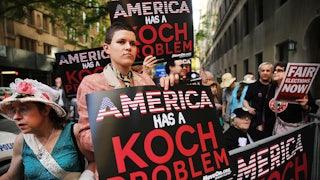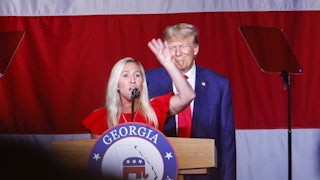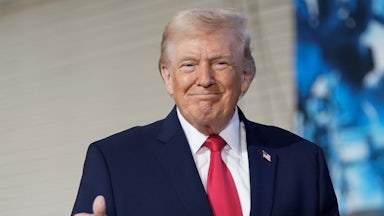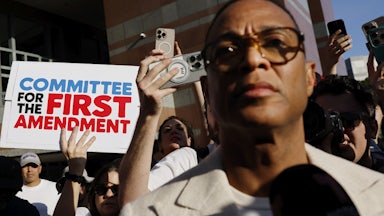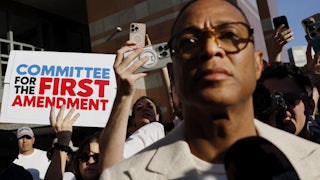In the second half of the 1950s, Brazil built itself a brand-new capital city—a bold modernist metropolis on the central highlands. An enterprising butcher named José Batista Sobrinho, living some two hours away, became one of the first meat suppliers to the companies that won the contracts to build Brasília. Workers flocked to the region, and Batista’s business grew. By the 1970s, his company was one of the dominant players in the vast meat market of central Brazil. By 1980, it was reaching into the south and southeast. It started exporting to foreign markets in 1996. Batista was so successful that none of his six children finished high school, swept up as they were in the family’s lucrative businesses. In the 2000s, his sons Wesley and Joesley took over and renamed the company, christening it with their father’s initials: JBS.
Today, JBS is the largest purveyor of animal protein in the world. Last year it became the biggest food company of any kind, surpassing the Swiss multinational Nestlé. And it’s a potent force in the United States as well: It is the country’s largest producer of beef and second-largest producer of pork and poultry, employing more than 66,000 people at nearly 60 facilities. All told, the company accounts for over 17 percent of revenue in the U.S. meat processing industry, and some years has accounted for 50 percent of U.S. beef exports. Its name might be unfamiliar to most U.S. consumers, but the JBS “fleet of brands stock some of America’s major retail chains and businesses: Kroger, Goya Foods, Albertsons (the parent company of Safeway, Jewel-Osco and Vons),” as The Washington Post reported last year. A business that began decades ago as a humble family-owned butcher shop in Brazil is now a central cog in the machinery of global mass food production.
Recently, JBS has taken pains to present its business—and meat consumption more broadly—as essentially environment-friendly. At the recent COP28 climate summit, for example, it promised to prioritize sustainably produced crops across its supply chain. But in the course of its meteoric rise, the company’s list of alleged malfeasances has grown almost cartoonishly long. It generates enormous greenhouse gas emissions. Multiple reports have uncovered ties to illegal deforestation of the Brazilian Amazon. The U.S. House of Representatives’ Select Subcommittee on the Coronavirus Crisis has investigated JBS for “callous disregard for workers’ health,” and the company has been investigated and fined by both the Occupational Safety and Health Administration and the Securities and Exchange Commission. In addition to all this, the environmental advocacy organization Mighty Earth wrote in an extensive 2022 report on the company that JBS has been “linked to bribery, price-fixing, pollution, worker exploitation, and allegations of selling tainted meat.”
Brothers Wesley and Joesley, worth billions, have repeatedly tangled with the law. Perhaps most notably, in 2017, their company was linked directly to corruption allegations against Brazil’s then-President Michel Temer and Aécio Neves, the center-right senator who lost the 2014 presidential race to Dilma Rousseff of the Workers’ Party by just three percentage points. Images clearly showed Ricardo Saud, head of institutional relations at JBS, transferring a suitcase containing 500,000 reais ($102,400) to a congressman who had long been an aide and confidant to Temer. Other images showed Neves’s cousin at JBS headquarters also meeting with Saud, leaving with his own half-million-reais suitcase. The kicker is that the images were likely leaked by Joesley Batista himself after he was ensnared by the blockbuster Operation Carwash, the largest—subsequently tainted—anti-corruption effort in Brazilian history. As part of a plea bargain, the Batista brothers offered damning testimony, including the aforementioned images, as well as recordings of conversations in which Temer urged Joesley to purchase the silence of the imprisoned former speaker of Brazil’s lower chamber of Congress, who was instrumental in the impeachment of Dilma Rousseff. This head-spinning narrative of high political intrigue speaks to the power and centrality JBS has assumed in the affairs of Latin America’s largest nation. It is anything but a mere meat processor.
Perhaps unsurprisingly, nothing much has come from the many accusations against the Batista brothers over the years. They maintain a controlling stake in JBS through a holding company they operate called J&F Investimentos. J&F, according to the SEC, “owns approximately 250 companies in 30 countries worldwide.” Indeed, it was the brothers themselves who, after spending six months in pretrial detention in Brazil on charges of insider trading in 2017–2018 (they were acquitted earlier this year), oversaw the successful entry of JBS into the U.S.
In 2007, JBS bought the Colorado-based Swift & Co. for about $225 million. On that occasion, as Forbes reported, Wesley Batista showed up at Swift headquarters wearing “the basic cowboy gear of jeans, boots and hat. He spoke no English and made a point of getting blood on his hands—showing butchers at his newly acquired Swift how to carve out the most dollars’ worth of cuts from a cow’s carcass.” The brothers did not stop there. Like their father decades before, they gobbled up competitors and grew quickly. By 2021, they supplied about a quarter of all U.S. beef—processing some 22,000 cattle a day—and a fifth of its pork.
Their aggressive expansionism earned the attention of the SEC, which in 2020 issued a cease-and-desist order naming the brothers specifically. The document weaves a tale of transnational corporate conspiracy involving JBS, the Brazilian Development Bank, and “various political parties and candidates in Brazil” who helped facilitate the company’s takeover of Pilgrim’s Pride Corporation, a meat company founded in Pittsburg, Texas, in 1946. The Batistas were fined $27 million, but the deal closed. “Engaging in bribery to finance their expansion into the U.S. markets and then continuing to engage in bribery while occupying senior board positions at Pilgrim’s reflects a profound failure to exercise good corporate governance,” Charles Cain, chief of the SEC division dedicated to enforcing the Foreign Corrupt Practices Act, asserted in 2020. As The Hill reported that year, “JBS’s other legal issues include the alleged involvement of Pilgrim’s Pride in a national poultry price fixing scheme. The company agreed Wednesday to pay a $110 million fine to settled charges related to the price fixing allegations in a separate action led by the Justice Department.” Such fines, however, are less than speed bumps for a company with revenues exceeding $50 billion per year.
Now the company is diversifying. Last year, J&F purchased manganese and iron ore mines in central Brazil—the company’s cradle—with the aim of eventually creating a “JBS of mining.” J&F also owns pulpmaker Eldorado Brasil, one of the world’s largest. Eldorado bills itself as “the world’s most modern and sustainable pulp company” and prides itself on its use of clean energy to power its operations as well as the fact that well over 90 percent of its workforce have undergone “anti-bribery training.” Yet the Environmental Paper Network, or EPN, an organization that brings together 150 civil society entities around the goal of sustainable paper production, argues the company can and should be doing more in the context of Brazilian deforestation. “Agriculture and cattle ranching are the notorious drivers of deforestation in the Brazilian Amazon,” Karen Vermeer, the pulp finance coordinator for the EPN, noted in a 2020 report. “But the cattle and soy industry are only one side of the coin, with pulp & paper companies refusing to carry the blame because they do not directly burn the land—other industries do that for them.” Vermeer calls the pulp industry, in which Eldorado is a central player, “a time-bomb which has been growing exponentially” due to “the global consumption of paper having quadrupled over the past 50 years.”
Crossing out yet another box on their bingo card of environmental hazard, the Batista brothers are now getting into oil as well. In early December, Bloomberg reported J&F’s acquisition of upstart Brazilian oil company Fluxus, founded by veterans of Petrobras and ExxonMobil. “We are very optimistic about the opportunities that [South America] presents in the oil, gas and energy sectors,” the CEO of Fluxus recently stated. Beginning in Argentina, the company is also looking to start operations in the more competitive arenas of Brazil, Bolivia, and Venezuela. Oil is obviously a cut-throat industry, but so is meat—and JBS came from nothing to dominate. The Batistas’ competitors would be unwise to dismiss them.
The scions of JBS have now assembled an impressively diverse portfolio of devastation, spanning multiple industries and continents. More than most titans of industry, they represent the marriage of profound political corruption and environmental degradation. The Batistas would surely say they are simply servicing healthy demand on multiple fronts. People want meat, after all, and industries want paper, minerals, and oil. The problem, of course, is that the company’s rapacity in meeting those demands has not shown itself responsive to legal limitations. The company’s diversified growth plans should be attracting more attention from those concerned about environmental degradation as well as those who worry about the unobstructed progress of corporate consolidation. “You reach a point and reach a certain reality, then you’re ready for another reality,” Wesley Batista told Forbes in 2011. “One step at a time.” Eventually, JBS may well trample the entire planet.

